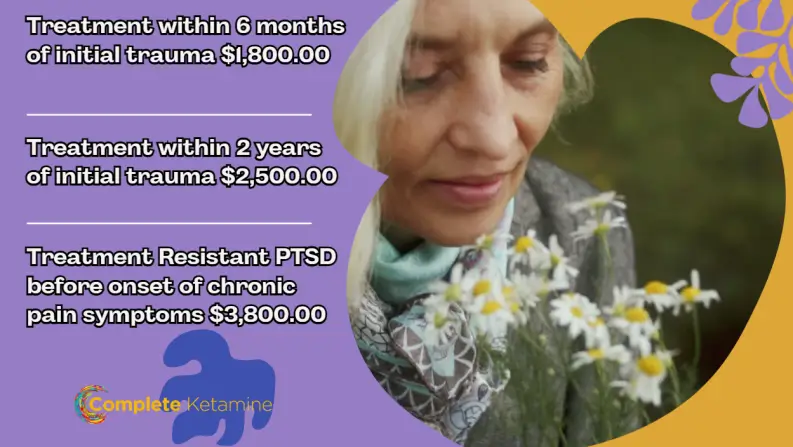How Does Ketamine Help PTSD?
Post-Traumatic Stress Disorder (PTSD) and Emotional Processing
Post-Traumatic Stress Disorder (PTSD) is not just a memory problem—it is a disorder of emotional processing. The brain struggles to integrate and resolve traumatic events, leaving individuals trapped in a cycle of fear, avoidance, and hypervigilance. Traditional treatments, such as SSRIs and talk therapy, often fall short because they do not directly address the trauma brain.
KBlend creates an environment where it is safe to experience the emotional pains of trauma, loss, and grief in such a way the body heals naturally. PTSD is often a consequence of stuffing emotions away—hiding pain that was never fully processed or resolved. Healing requires facing and integrating that pain, rather than suppressing. Patients often describe the process as, "Allowing God to satisfy the pain."
KBlend creates an environment where it is safe to experience the emotional pains of trauma, loss, and grief in such a way the body heals naturally. PTSD is often a consequence of stuffing emotions away—hiding pain that was never fully processed or resolved. Healing requires facing and integrating that pain, rather than suppressing. Patients often describe the process as, "Allowing God to satisfy the pain."
The Fear Processing Center
The amygdala, the brain’s fear center, is hyperactive in individuals with PTSD. This overactivation leads to flashbacks, intrusive memories, and an inability to feel safe, even in non-threatening environments. Studies have shown that ketamine helps reduce amygdala hyperactivity, making it possible for patients to experience traumatic memories without triggering extreme fear responses.
Memory Reconsolidation
PTSD is not just about remembering trauma—it’s about how the brain remembers trauma. Every time a traumatic memory surfaces, the brain has an opportunity to "reconsolidate" or rewrite how it is stored. Research suggests that ketamine facilitates this reconsolidation process by weakening the emotional intensity of traumatic memories, allowing patients to integrate them without re-experiencing extreme distress.
Neuroplasticity: Breaking the Trauma Loop
PTSD traps individuals in neurological loops—thought patterns and emotional responses that repeat endlessly. Ketamine works by enhancing neuroplasticity, helping the brain create new pathways that allow for emotional flexibility. Instead of being stuck in fear-based responses, patients can process emotions in healthier, more adaptive ways.
Faith, Surrender, and Healing
The struggle with PTSD often comes from an attempt to control and protect. Trauma leaves individuals with the feeling that the world is unsafe and that they must take extreme measures to avoid hurt as they cannot resolve past pain. True healing requires faith—a willingness to believe that peace is possible, even when it doesn’t feel logical.
KBlend helps patients move beyond control and into surrender. Allowing painful emotions to surface in a safe, supported space, faith enables individuals to accept what has happened, rather than endlessly fighting against it. This is where faith plays a critical role—believing pain is an invitation to allow the creator to be the satisfier, transforming the bad things into opportunity to experience the majesty life has to offer.
KBlend helps patients move beyond control and into surrender. Allowing painful emotions to surface in a safe, supported space, faith enables individuals to accept what has happened, rather than endlessly fighting against it. This is where faith plays a critical role—believing pain is an invitation to allow the creator to be the satisfier, transforming the bad things into opportunity to experience the majesty life has to offer.
Final Thoughts
Ketamine is a powerful tool for PTSD treatment, not just because it reduces symptoms, but because it helps rewrite the brain’s response to trauma. By satisfying fear, enhancing neuroplasticity, and supporting emotional integration, ketamine provides an opportunity for deep, lasting healing. When combined with KBlend’s approach of surrender and faith, patients are able to move beyond trauma—not by forgetting, but by finding the depths and beauty of life within it.
Buying Options:
- Category: PTSD
- All pricing packages are subject to medical approval
- Refunds offered if a patient does not qualify for a discounted internet purchase
- Internet pricing only available online when paid in advance of consultation
- Internet pricing not available in-store or over the phone
For more details on ketamine treatment, pricing, and eligibility, visit our FAQ page.
What to Know Before Starting Ketamine Therapy
1. Schedule and Commitment
- ALL Treatments are performed in Monroe or Lansing Location.
- Most patients undergo two to three treatments per week over a two to three-week period.
- A typical initial treatment series consists of six infusions.
- Larger Packages may include more than 6 infusions.
- Intervention is one-time, one infusion, unless altered by provider
2. Transportation / Post-Treatment
- Patients must arrange for a driver to and from the clinic due to post-treatment effects.
- After each infusion, patients are monitored to ensure stability before discharge.
- Patients and Drivers will be given discharge instructions.
3. Pre-Treatment Preparations
- On the day of your session, avoid heavy meals to reduce nausea.
- Stay well-hydrated leading up to your appointment.
- Stop eating and drinking 4 hours prior to treatment.
- Do not come in dehydrated!
4. Medical Considerations
- Patients with high blood pressure should have their condition controlled before starting treatment.
- During treatment, vital signs (heart rate, blood pressure, oxygen levels) are closely monitored.
- Avoid Conflict and difficult situations before treatment.
5. Potential Side Effects
- Some patients may experience dissociation (a floating sensation or altered perception).
- Mild nausea can occur but can often be managed with proper dietary adjustments.
6. Patient & Caregiver Education
- Understanding the process and potential side effects helps ensure a successful treatment experience.
- Patients and caregivers should review all information before starting therapy.

